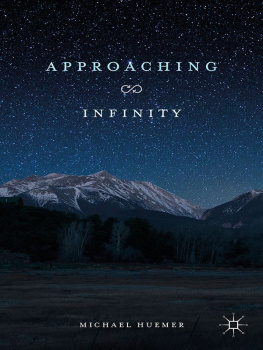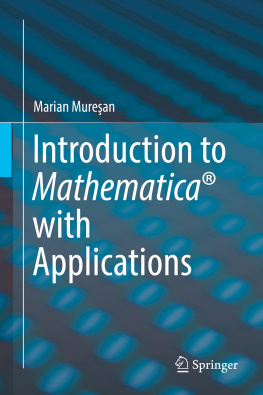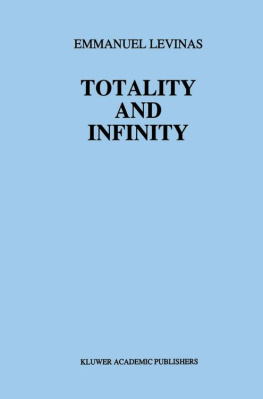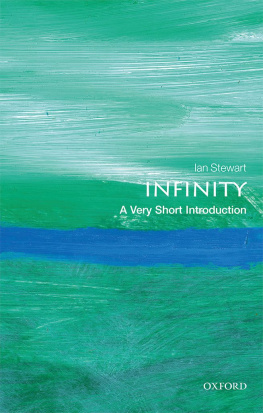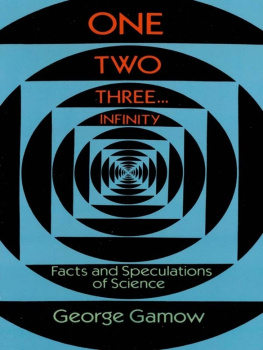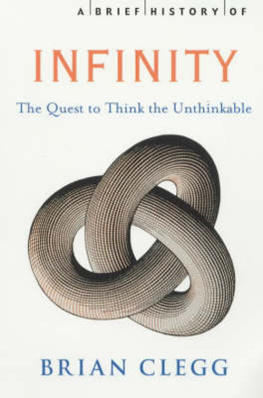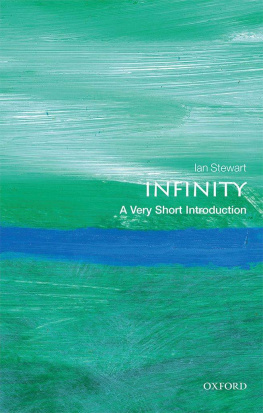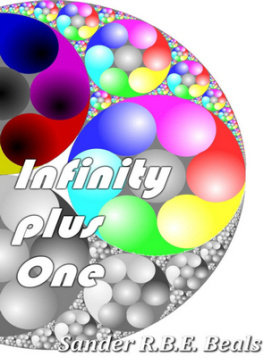Springer Nature. - Approaching Infinity
Here you can read online Springer Nature. - Approaching Infinity full text of the book (entire story) in english for free. Download pdf and epub, get meaning, cover and reviews about this ebook. City: New York, year: 2016, publisher: Palgrave Macmillan;Springer Nature., genre: Romance novel. Description of the work, (preface) as well as reviews are available. Best literature library LitArk.com created for fans of good reading and offers a wide selection of genres:
Romance novel
Science fiction
Adventure
Detective
Science
History
Home and family
Prose
Art
Politics
Computer
Non-fiction
Religion
Business
Children
Humor
Choose a favorite category and find really read worthwhile books. Enjoy immersion in the world of imagination, feel the emotions of the characters or learn something new for yourself, make an fascinating discovery.
- Book:Approaching Infinity
- Author:
- Publisher:Palgrave Macmillan;Springer Nature.
- Genre:
- Year:2016
- City:New York
- Rating:4 / 5
- Favourites:Add to favourites
- Your mark:
- 80
- 1
- 2
- 3
- 4
- 5
Approaching Infinity: summary, description and annotation
We offer to read an annotation, description, summary or preface (depends on what the author of the book "Approaching Infinity" wrote himself). If you haven't found the necessary information about the book — write in the comments, we will try to find it.
Approaching Infinity — read online for free the complete book (whole text) full work
Below is the text of the book, divided by pages. System saving the place of the last page read, allows you to conveniently read the book "Approaching Infinity" online for free, without having to search again every time where you left off. Put a bookmark, and you can go to the page where you finished reading at any time.
Font size:
Interval:
Bookmark:
Approaching Infinity
Also by Michael Huemer
ETHICAL INTUITIONISM
THE PROBLEM OF POLITICAL AUTHORITY
SKEPTICISM AND THE VEIL OF PERCEPTION
Approaching Infinity
Michael Huemer
Professor of Philosophy, University of Colorado at Boulder, USA


Michael Huemer 2016
All rights reserved. No reproduction, copy or transmission of this publication may be made without written permission.
No portion of this publication may be reproduced, copied or transmitted save with written permission or in accordance with the provisions of the Copyright, Designs and Patents Act 1988, or under the terms of any licence permitting limited copying issued by the Copyright Licensing Agency, Saffron House, 610 Kirby Street, London EC1N 8TS.
Any person who does any unauthorized act in relation to this publication may be liable to criminal prosecution and civil claims for damages.
The author has asserted his right to be identified as the author of this work in accordance with the Copyright, Designs and Patents Act 1988.
First published 2016 by
PALGRAVE MACMILLAN
Palgrave Macmillan in the UK is an imprint of Macmillan Publishers Limited, registered in England, company number 785998, of Houndmills, Basingstoke, Hampshire RG21 6XS.
Palgrave Macmillan in the US is a division of St Martins Press LLC, 175 Fifth Avenue, New York, NY 10010.
Palgrave Macmillan is the global academic imprint of the above companies and has companies and representatives throughout the world.
Palgrave and Macmillan are registered trademarks in the United States, the United Kingdom, Europe and other countries.
ISBN: 9781137560858 hardback ISBN: 9781137560865 paperback
This book is printed on paper suitable for recycling and made from fully managed and sustained forest sources. Logging, pulping and manufacturing processes are expected to conform to the environmental regulations of the country of origin.
A catalogue record for this book is available from the British Library.
Library of Congress Cataloging-in-Publication Data
Names: Huemer, Michael, 1969 author.
Title: Approaching infinity / Michael Huemer.
Description: New York : Palgrave Macmillan, 2016. | Includes index.
Identifiers: LCCN 2015040546| ISBN 9781137560858 (hardback) | ISBN 9781137560865 (pbk.)
Subjects: LCSH: Infinite.
Classification: LCC BD411 .H84 2016 | DDC 111/.6dc23
LC record available at http://lccn.loc.gov/2015040546
For Iskra
Contents
List of Figures
Preface
For many years, I have made a point of confounding my philosophy students with a variety of paradoxes, including several paradoxes of the infinite. And for many years, I tried myself to think through these paradoxes, without success. I list seventeen of these paradoxes in there were three philosophical questions about the infinite that exercised me.
Here is the first issue. It seems that there are some infinite series that can be completed. For instance, for an object to move from point A to point B, it must first travel half the distance, then half the remaining distance, then half the remaining distance, and so on. According to one famous argument, because this is an infinite series, the object can never reach point B. The proper response seems to be to insist that one can in fact complete an infinite series.
On the other hand, it seems that there are other infinite series that cannot be completed. For instance, imagine a lamp that starts out on, then is switched off after half a minute, then back on after another quarter minute, then off after another eighth of a minute, and so on. At the end of one minute, is it on or off? The proper response seems to be that one could not complete such an infinite series of switchings. We might think this is because an infinite series, by definition, is endless, and one cannot come to the end of something that is endless.
In other words, the solution to the first puzzle (one can complete an infinite series) seems to be the opposite of the solution to the second puzzle (one cannot complete an infinite series). Thats puzzling. What we would like to say is that some infinite series are possible, and others are impossible. But why? What is the difference between the infinite series of halfway-motions, and the infinite series of lamp-switchings? Thats the first philosophical question I wanted to answer.
This puzzle is tied up with a popular genre of arguments in philosophy: it is common to argue that some philosophical theory must be rejected because it leads to an infinite regress. For instance, if every event has a cause, and the cause of an event is also an event, then there must be an infinite regress of causes. To avoid this, some say, we should reject the idea that everything has a cause; instead, we should posit a first cause, something that caused everything else and was itself uncaused.
But almost as common as infinite regress arguments is a certain type of response, which claims that there is nothing wrong with the infinite regress. For instance, some say that we should simply accept that there is an infinite series of causes stretching into the past forever. Now, there seems to be wide agreement among philosophers that some but not all infinite regresses are bad; but there has been no consensus on which regresses are bad (vicious) and which benign. Hence, the second philosophical question I wanted to answer: What makes an infinite regress vicious or benign?
Finally, I started reflecting on infinities in science, where there seems to be an analogous issue. Some infinities are considered bad for instance, the infinite energy density and infinite spacetime curvature of a black hole are considered problems in astrophysics. They are thought to indicate a breakdown of accepted theories (notably, general relativity), and astrophysicists have been trying to devise new theories that eliminate these infinities. But there are other infinities that no one seems worried about: no one seems to consider the notion of an infinitely large universe, or the notion of an infinite future, to be problematic. Why is this? What makes some infinite quantities in a theory problematic while others are perfectly acceptable?
One can see that these three questions Why are some infinite series completeable and others not?, Why are some infinite regresses vicious and others not?, and Why are some infinite quantities problematic and others not? are quite similar, and so perhaps they have a common answer. After several years of puzzlement concerning the first two questions, I finally tried to connect them with the third question. It was then that I thought of a theory that seems to me to account for which sorts of infinities are possible and which impossible. After publishing one paper on the subject (Virtue and Vice among the Infinite), I decided to expand my ideas into this book.
I would like to thank Stuart Rachels for the conversations about the infinite that led to this expansion. In addition, I am grateful for the comments of Adrian Moore and Matt Skene on earlier drafts of the manuscript, and the questions and comments of Peter Klein, Ted Poston, Jeanne Peijnenberg, David Atkinson, and the other participants of the Infinite Regress Workshop organized by Scott Aiken at Vanderbilt University in October, 2013, where I presented my earlier paper on the subject. If there are any errors in this book, as surely there must be, they are the fault of one of these other philosophers most likely Peter Klein, because he supervised my PhD and should have trained me better.
Next pageFont size:
Interval:
Bookmark:
Similar books «Approaching Infinity»
Look at similar books to Approaching Infinity. We have selected literature similar in name and meaning in the hope of providing readers with more options to find new, interesting, not yet read works.
Discussion, reviews of the book Approaching Infinity and just readers' own opinions. Leave your comments, write what you think about the work, its meaning or the main characters. Specify what exactly you liked and what you didn't like, and why you think so.

